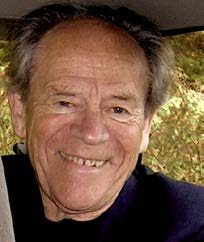
President Emeritus
Neurobiologist Torsten Wiesel is co-director of the Shelby White and Leon Levy Center for Mind, Brain and Behavior at The Rockefeller University, where he served as president from 1992 to 1998. His discoveries have significantly shaped the understanding of the brain’s structure, function, and development. In 1981, he and his longtime associate, David Hubel of Harvard Medical School, shared the Nobel Prize in Physiology or Medicine for elucidating how visual information collected by the retina is transmitted to and processed in the brain’s visual cortex. In addition to revealing how the cerebral cortex is organized at the cellular level, their research has led to improved therapies for children born with certain vision disorders.
Dr. Wiesel earned a medical degree from the Karolinska Institute in 1954, and the following year came to the U.S. as a fellow in ophthalmology at Johns Hopkins Medical School. He moved to Harvard Medical School in 1959, and was subsequently appointed professor of physiology, professor of neurobiology, and chairman of the department of neurobiology.
In 1983, Dr. Wiesel joined the Rockefeller faculty as head of a new laboratory of neurobiology; later that year he was appointed the University’s Vincent and Brooke Astor Professor. His work at Rockefeller focused on the organization and development of the central nervous system, using the visual system as a model for mechanisms that apply to the brain as a whole.
Since leaving Rockefeller’s presidency, Dr. Wiesel has focused much of his attention on international science advocacy and has served as president of the International Brain Research Organization and secretary-general of the Human Frontier Science Program. He currently chairs the board of the Okinawa Institute of Science and Technology. Dr. Wiesel is a member of the American Academy of Arts and Sciences and the American Philosophical Society, and a foreign member of the Royal Society. He has also been elected to the U.S. National Academy of Sciences and National Academy of Medicine. In 2005, the National Academies awarded Dr. Wiesel the David Rall Medal, recognizing his distinguished leadership of the Academies’ Committee on Human Rights, which he chaired from 1994 to 2004.
In addition to the Nobel Prize, Dr. Wiesel has received many other honors, including the U.S. National Medal of Science, the Ledlie Prize from Harvard, Columbia University’s Louisa Gross Horwitz Prize, the Scientific Achievement Award from the National Eye Institute, and the Helen Keller Prize for Vision Research. Among the numerous institutions that have awarded him honorary degrees are Harvard Medical School, New York University, Johns Hopkins, the University of Pennsylvania, the Karolinska Institute, Ohio State University, the University of Bergen, Linkoping University, and Ancona University.









